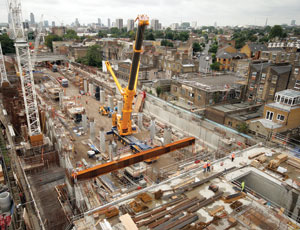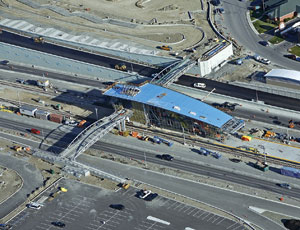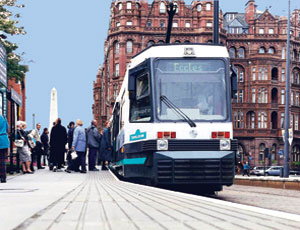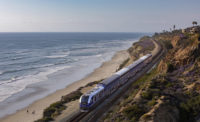After a year that had many firms on track for record revenue in transportation, the economic crisis that now spans the globe has raised fears that many future projects could be derailed in the coming months. Although market observers see significant continued demand for transportation work, future funding streams remain uncertain as governments grapple with sagging tax revenue, private developers retrench and the credit market threatens public-private partnerships.



While funding is often tenuous in the transportation market, the widespread level of instability has left many scrambling for answers.
“We’re in an economic time that none of us who’ve been in the business awhile have ever seen before,” says Stuart Graham, advisor to the chief executive officer of Sweden-based Skanska. “On the one hand you’ve got governments around the world talking about providing significant stimulus for infrastructure to create jobs. On the other hand, no one knows how bad this economic situation will get or how far tax revenue will fall.”
Like many firms, Skanska was expecting an up year in 2008, with strength in many markets worldwide. For contractors in particular, the outlook on current work remains solid heading into 2009, but new business represents an unknown.
“It’s difficult for me to look at 2009 and say if [new] business will be off 10% or 20%,” Graham adds. “We know what we have on the book, and those contracts aren’t cancelled. It just seems to me that the economic news gets worse every day, so it’s difficult to forecast where we’re headed.”
It’s a “culture of fear” that has some firms pulling back, says Derish Wolf, chairman and CEO of East Orange, N.J.-based Louis Berger Group. “We’re waiting for the other shoe to drop, but we haven’t seen it yet,” he says. “The irony is that right now global sales are up 20% for the [last] three months. At the same time, we’re looking at all of our marginal operations and trimming them back.”
Unstable oil markets are prompting many previously booming parts of the world to pause. Denver-based PCL Construction has reaped the rewards in the Canadian provinces of Saskatchewan and Alberta in recent years, as oil from the tar sands region and commodities have driven development in other infrastructure markets in western Canada.
With commodities prices dropping, Paul Douglas, chief operating officer at PCL, says many petroleum projects are being put on hold. “We’ve had work stoppages where they’ve told us they aren’t moving ahead on new projects or even capping some [projects] under construction at grade,” he said. “We haven’t seen that in about 20 years.”
With the region’s prime economic driver cooling off, Douglas says it adds uncertainty to future infrastructure demand. “We know that 2009 is still looking pretty solid,” he says. “It’s 2010, 2011 and 2012 where we just don’t know.”
PCL is still to break ground on a $400-million expansion of Edmonton International Airport in August, with completion set for late 2012. Since 2007, the firm has worked on more than $200 million in light-rail transit projects in Edmonton.
Likewise, some parts of the oil-rich Middle East could also feel the effects, as plummeting prices cause governments to adjust their budgets.
Executives at New York-based Parsons Brinckerhoff have seen a dramatic shift in one of the world’s hottest markets—Dubai. With several high-profile building projects being put on ice, some of the infrastructure to support them is being deferred, says Stuart Glenn, chief operating officer and president of PB International. In 2007, PB began preliminary work on the 30-mile Dubai Metro Purple Line, but the move to construction was put on hold this fall.
“Without question, projects are going very much into a deferred mode,” Glenn said. “My view of the Middle East is that we’ll be a lot quieter next year.”
Still, some projects are moving forward. Fred Werner, Americas Transportation Group CEO at Los Angeles-based AECOM, says he sees markets like Dubai slowing down next year, but other areas will stay on track. In November, AECOM won a $149-million contract for program management of the New Doha Port project in Qatar. The $7-billion project is currently the world’s largest greenfield port development.
While parts of the Middle East are feeling the pinch, many firms remain bullish on North Africa. AECOM is among several firms entrenched in Libya. In late 2007, the firm signed a five-year contract for program management of the Libya Housing and Infrastructure Board’s $50-million nationwide housing program. The contract, which has a potential value of $574 million, would include overseeing significant upgrades to roads, bridges and highways.
In January, Strabag SE of Austria won a $550-million contract with Libya’s HIB to upgrade infrastructure in the city of Tajura. The project includes 200 kilometers of roads, bridges and other projects to be built within four years.
In May, a consortium led by Strabag began work on the second extension of the Algiers Metro line. The $320-million 4-km project includes a 2.7-km tunnel, four stations, one bridge over a motorway and one river crossing. Completion is scheduled for 2010.
India’s Hot Market
Further east, India continues to hold promise. The country’s recent rail, transit and airport expansions have been a boon for PB. The company is part of a joint venture with Systra that is overseeing a new 7-mile line on the Mumbai Metro. The firm also is overseeing modernization of New Delhi’s Indira Gandhi International Airport, which includes construction of a new runway, terminal building and other supporting infrastructure. The runway is scheduled to open in 2010. PB also has projects in Bangalore and Calcutta. “As we sit and look in India, we remain confident that, with the increasing urbanization and wealth creation of India, the demands for infrastructure will continue to support growth,” says Keith Hawksworth, CEO of Parsons Brinckerhoff.
Among the continued drivers of work in India is the 2010 Commonwealth Games. At the end of 2007, London-based Mott MacDonald was brought in to provide structural and civil designs for part of the new Airport Metro Express Line that will connect New Delhi Railway Station to airports serving the capital of New Delhi.
Feeling the Pinch
Once-bountiful opportunities in China and Southeast Asia are also uncertain. As consumer spending has dropped in the U.S. and other markets, China is feeling the pinch. However, firms are hopeful that government intervention will grease the wheels. The Chinese government announced a $586-billion stimulus package in early November to help keep the country growing.
“China’s support of growth and ongoing urbanization obviously requires transport,” PB’s Glenn says.
This year, Maunsell AECOM was chosen to provide preliminary design support services for the Tai Wai to Hung Hom section of Hong Kong’s Sha Tin-Central Link. The 11-mile project will connect the Northeast New Territories and Hong Kong Island via southeast Kowloon. Design is scheduled for completion in mid 2009, with construction set to start in late 2010.
Along with government spending, firms are closely watching credit markets. Available financing and willing investors helped fuel increased use of public-private partnerships in recent years, but many are now seeing those opportunities dry up.
Less Private Investment?
Hawksworth says that while he expects current projects to move forward, private-public partnerships will be a challenge in the coming months—maybe years.
“There’s been a lot of talk about the fact that investors are really moving away from infrastructure projects,” he says. “We’re seeing some reduction in interest in Australia. You’ll see a movement away from PPP as the preferred delivery method in Australia and a move back to the government sector. It will be hard though. The PPP projects were over $1 billion. If you’ve got that kind of money these days, you can find better uses for it.”
In Canada, PCL has similar fears, but is more optimistic. While PPP has been popular in Canada, Douglas says he believes the delivery method is off the table in the coming months. “All of our financial partners on these projects are struggling to find money,” he says. “We hear the right story. If there’s an investment class to have, it’s government-backed assets. But there’s no money to find right now. I believe that will be one of the first things to come back once the money starts flowing. There probably isn’t a better asset class to invest in.”
Europe Grows
In Europe, many markets continue to move forward. Eastern European countries have been the source of significant work in recent years as European Union funding flows in to help create much needed infrastructure.
This year, Skanska was awarded hundreds of millions of dollars in projects in Poland and the Czech Republic, including sections of a new ring road around Prague, bypass roads in Warsaw, a 30-km section of railway in the Czech Republic and a runway project in Powidz, Poland.
In October, a consortium led by Strabag won a $630-million contract for work on a Warsaw bypass road. Construction is scheduled to begin early in 2009 and is expected to last 30 months. Strabag also is part of a consortium that began construction in November on a $430-million 12-km bypass road around the city of Bielsko-Biala in southern Poland, near the Czech border. The project is expected to take 30 months.
One megadeal that firms hope to see stay on track is the $23.6-billion Crossrail project, a 118-km line with new twin-bore 21-km-long tunnels under central London. This fall, Crossrail developers announced three bidders for the project: Bechtel; Legacy 3, a joint venture between PB, London-based Balfour Beatty Management and Santa Monica, Calif.-based Davis Langdon; and Transcend, a joint venture between AECOM, Engelwood, Colo.-based CH2M Hill Cos. and London-based Nichols Group.
“Apart from Crossrail, I don’t see any massive new projects in the immediate future,” Glenn says.
PB is currently program manager for the $1-billion North London Railway infrastructure project, scheduled to complete in 2011. The project is part of alarger $14-billion program to expand the railways around London.
In March, a joint venture of Pasadena, Calif.-based Jacobs and U.K.-based Atkins won a contract for design and construction on the estimated $900-million M74 project in Glasgow, Scotland. The 5-mile project, which includes 12 significant bridges, is being built in anticipation of the 2014 Commonwealth Games. In October, AECOM and Jacobs were awarded a design and consultancy contract for a $970-million Metrolink expansion in Manchester. The new lines would cover 20 miles and include 26 stops, with the first sections opening in 2011.
Like many executives in the transportation market these days, Skanska’s Graham is trying to remain optimistic, yet realistic about pending deals. “The market conditions in finance are changing so rapidly and we’re several months away from being ready to close that financing,” he says. “At that time, the market conditions will determine if there is a financial close. Hopefully the credit markets will loosen up and be normal. You just can’t say it will happen with any confidence these days.”




Post a comment to this article
Report Abusive Comment